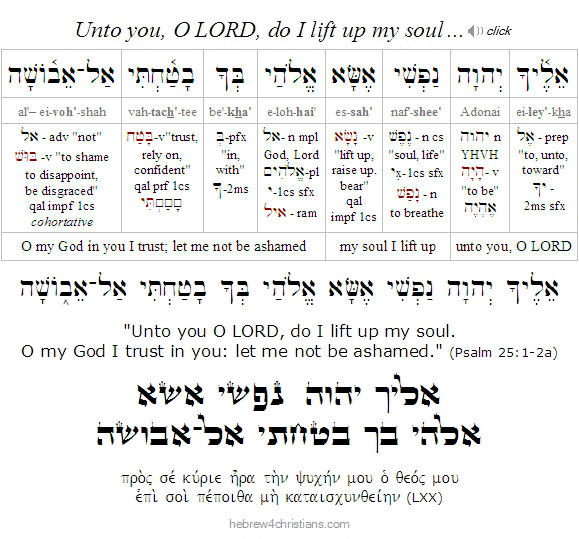|
When Moses proclaimed the good news of God's forthcoming redemption for Israel, the Torah states that the people could not listen because they were "short of breath" (Exod. 6:9). Interestingly, this phrase (i.e., mi'kotzer ru'ach: מִקּצֶר רוּחַ) can also mean "lacking in spirit," as if in a paralyzed state of hopelessness. But how did the people become so downhearted? Had they forgotten the promise given to Abraham (Gen. 15:12-14)? Had they disregarded Joseph's final words (Gen. 50:24-25)?
According to some of the sages, part of the reason for their "shortness of breath" (besides the cruel bondage and hard labor imposed on them) was that the Israelites miscalculated the duration of their 400 year exile, and therefore they began to lose hope. When members of the tribe of Ephraim tried to escape from Egypt some 30 years before the time of the redemption, they were all killed by the Philistines, and many of the Israelites began to believe that they would remain as perpetual slaves (Shemot Rabbah, 20:11). They became "short of breath" and could no longer receive the message of the Holy Spirit...
Indeed, life in this evil world can be suffocating at times. And though we may not be under the oppression of a cruel Pharaoh, we are affected by the "princes of this age" who spurn the message of the Messiah's redemption and love, and we are still subjected to bondage imposed by taskmasters who defy the LORD and who seek to enslave us by means of lies, propaganda, and threats of violence... The devil is still at work in the hearts and minds of many of his "little Pharaohs" that govern the world system... The Scriptures make it clear that we are engaged in genuine spiritual warfare: "For we do not wrestle against flesh and blood, but against the rulers, against the authorities, against the cosmic powers over this present darkness, against the spiritual forces of evil in the heavenly places" (Eph. 6:12).
It is evident that one of the central purposes of God's redemption is to bestow freedom and dignity upon his people. As the story of Pharaoh reveals, God does not take kindly to oppressors, dictators, and other megalomaniacal world leaders who deny the truth and who therefore seek to enslave (or kill) human beings created in His image and likeness. Just as God judged Egypt for its oppression and violence, so He will one day break the "rulers of this world" with a rod of iron and dash them in pieces like a potter's vessel (Psalm 2:9-10).
To help us "catch our breath" during this time of waiting, it is important to remember that the LORD redeems us so that we may become His children and therefore be clothed with everlasting dignity... Our redemption makes us heirs of the Kingdom of God and citizens of heaven. We must never regard ourselves as slaves - not to the State, not to the bankers, not to fear, and not to religion (Gal. 5:1). God gave up His Son for us so that we could be made free to live with honor as his dearly loved children.... All the threats of the world system - economic, political, religious, social, etc. - are ultimately made empty and vain by the glorious redemption promised to us in Yeshua our Savior.
There is an old story of the Maggid of Brisk who each year would bring proof from the Torah that the Messiah would come that year. Once a certain Torah student asked him, "Rabbi, every year you bring proof from the Torah that the Messiah must come that year, and yet he does not come. Why bother doing this every year, if you see that Heaven ignores you?" The Maggid replied, "The law states that if a son sees his father doing something improper, he is not permitted to humiliate him but must say to him, 'Father, the Torah states thus and so.' Therefore we must tell God, who is our Father, that by keeping us in long exile, he is, in a sense, causing injustice to us, and we must point out, "thus and so it is written in the Torah," in hope that this year he might redeem us." This same principle, of course, applies to those of us who are living in exile and who eagerly await the second coming of the Messiah Yeshua. We should continue asking God to send Him speedily, and in our day, chaverim...
The Scriptures declare that "we are saved by hope" (ελπιδι εσωθημεν), that is, we are saved through an earnest expectation of good to come on account of the promises of the LORD God of Israel. Amen. The LORD is called "The God of Hope" (אֱלהֵי הַתִּקְוָה), indicating that He is its Author and its End (Rom. 15:13). God both gives birth to our hope (tikvah) and is the satisfaction of our heart's deepest longings. For those with God-given hope, gam zu l'tovah – all things work together for good (Rom. 8:28). In light of God's promises, hope is the one "work" that we are called to vigorously perform: "What shall we do, that we might work the works of God?" Yeshua answered, "This is the work of God, that you trust (i.e. hope) in the one whom He sent" (John 6:28-29).
Don't let the world system destroy or impugn your hope, chaverim... If the devil can't seduce you with illusory hope or counterfeit joy, he will attempt to oppress you with fear and doubt. Fight the good fight of faith and refuse to succumb to despair. Run the race before you with endurance (Heb. 12:1). Look up, for the time of your deliverance draws near... God redeems us for the sake of His love and honor... It is the "breath of God" that gives us life and courage to face this dark and perverse world (John 20:22). May you be filled with the hope and strength that comes from the Holy Spirit.
אֵלֶיךָ יְהוָה נַפְשִׁי אֶשָּׂא
אֱלֹהַי בְּךָ בָטַחְתִּי אַל־אֵב֑וֹשָׁה
אַל־יַעַלְצוּ אֹיְבַי לִי
e·ley'·kha A·do·nai naf·shee es·sa
E·lo·hai be·kha va·tach'·tee · al–e·vo'·shah
al–ya·al·tzoo oy·vai lee

"Unto thee, O LORD, do I lift up my soul.
O my God, I trust in thee: let me not be ashamed,
let not mine enemies triumph over me."
(Psalm 25:1-2)

Download Study Card
Hebrew Lesson
Psalm 25:1-2a Hebrew reading (click):
 |
Addendum: How long were the Israelites in Egypt?
Some of the sages argued that Israel was in bondage in Egypt for just 210 years and not 400 years as the Torah states. They reason that the 400 years of bondage mentioned in Torah must include the time of the patriarchs in Canaan, and subtracting that yields 210 years. Although there are some other explanations, in general, Jewish tradition says that the countdown of 400 years began with Isaac's birth. Now Isaac was sixty years old when Jacob was born, and Jacob was 130 years old when he went down to Egypt, so that yields 190 years which subtracted from 400 leaves 210 years... The sages interpret the phrase "a land that is not theirs" (in Gen. 15:13) to refer to both Canaan and the of Egypt and therefore the two may be considered a unit from an exile point of view. They further claim the genealogy given in Exodus 6:16-26 regarding the toldot of Moses (i.e, Levi - Kohath - Amram - Moses) would make each generation 100 years in length, which is problematic since Amram was said to marry Yocheved when she was 130 years old.
In response we should note that textual criticism of the Torah indicates that there may be gaps in the genealogical record given in Exodus, and therefore we should not be dogmatic about whether they are complete or not. However it's written in Exodus 12:40: "Now the length of time the Israelites lived in Egypt (בְּמִצְרָיִם) was 430 years" (the Hebrew בְּמִצְרָיִם שְׁלשִׁים שָׁנָה וְאַרְבַּע מֵאוֹת שָׁנָה is unmistakable), which agrees with God's statement of four hundred years (i.e., arba me'ot shanah: אַרְבַּע מֵאוֹת שָׁנָה) of bondage (Gen. 15:13). Furthermore Stephen quoted Genesis 15:13 in his defense before the Council saying: "But God spoke as follows: 'Your descendants will be foreigners in a foreign country, whose citizens will enslave them and mistreat them for four hundred years" (Acts 7:6), which again states it was 400 years (in Greek: ἔτη τετρακόσια). So despite Jewish midrash stating otherwise, it seems clear the Israelites were in bondage for at least 400 years.
|




